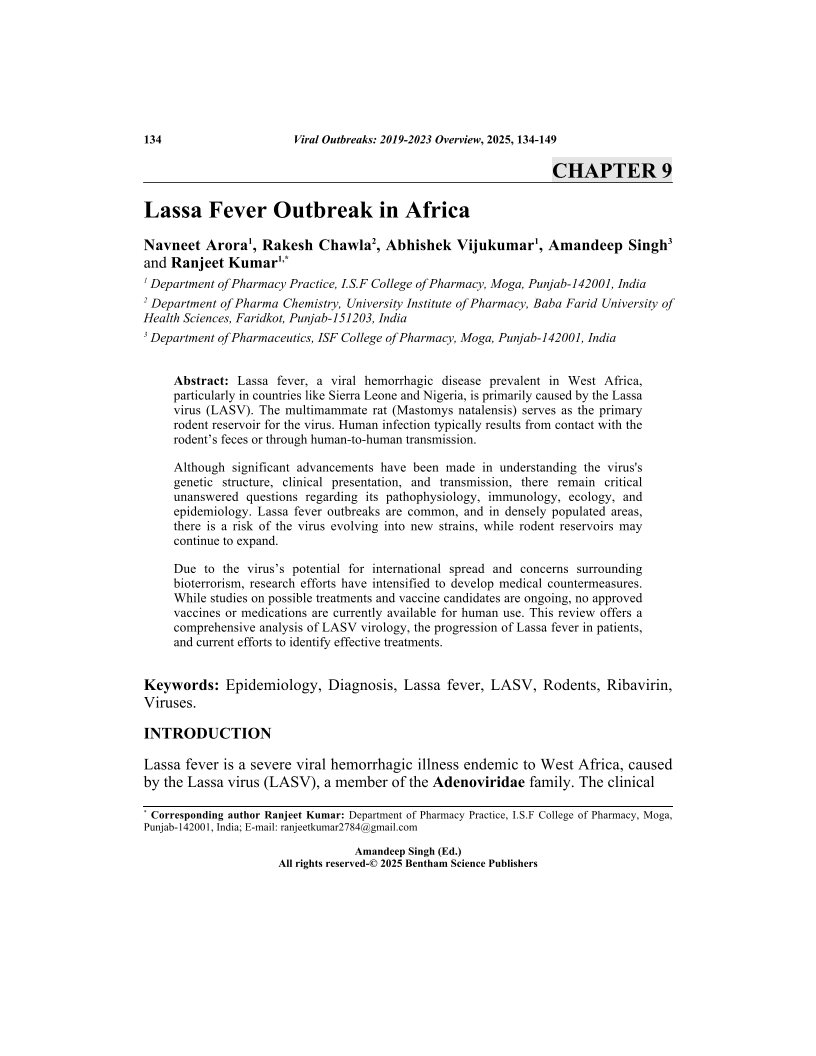Lassa Fever Outbreak in Africa

- Authors: Navneet Arora1, Rakesh Chawla2, Abhishek Vijukumar3, Amandeep Singh4, Ranjeet Kumar5
-
View Affiliations Hide Affiliations1 Department of Pharmacy Practice, I.S.F College of Pharmacy, Moga, Punjab 142001, India 2 Department of Pharma Chemistry, University Institute of Pharmacy, Baba Farid University of Health Sciences, Faridkot, Punjab-151203, India 3 Department of Pharmacy Practice, I.S.F College of Pharmacy, Moga, Punjab-142001, India 4 Department of Pharmaceutics, ISF College of Pharmacy, Moga, Punjab-142001, India 5 Department of Pharmacy Practice, I.S.F College of Pharmacy, Moga, Punjab-142001, India
- Source: Viral Outbreaks: 2019-2023 Overview , pp 134-149
- Publication Date: May 2025
- Language: English
Lassa Fever Outbreak in Africa, Page 1 of 1
< Previous page | Next page > /docserver/preview/fulltext/9789815313475/chapter-9-1.gif
Lassa fever, a viral hemorrhagic disease prevalent in West Africa, particularly in countries like Sierra Leone and Nigeria, is primarily caused by the Lassa virus (LASV). The multimammate rat (Mastomys natalensis) serves as the primary rodent reservoir for the virus. Human infection typically results from contact with the rodent's feces or through human-to-human transmission. Although significant advancements have been made in understanding the virus's genetic structure, clinical presentation, and transmission, there remain critical unanswered questions regarding its pathophysiology, immunology, ecology, and epidemiology. Lassa fever outbreaks are common, and in densely populated areas, there is a risk of the virus evolving into new strains, while rodent reservoirs may continue to expand.Due to the virus's potential for international spread and concerns surrounding bioterrorism, research efforts have intensified to develop medical countermeasures. While studies on possible treatments and vaccine candidates are ongoing, no approved vaccines or medications are currently available for human use. This review offers a comprehensive analysis of LASV virology, the progression of Lassa fever in patients, and current efforts to identify effective treatments.
-
From This Site
/content/books/9789815313475.chapter-9dcterms_subject,pub_keyword-contentType:Journal -contentType:Figure -contentType:Table -contentType:SupplementaryData105

